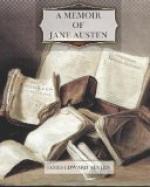Some of his sayings of course survive in family tradition. He was once calling on a gentleman notorious for never opening a book, who took him into a room overlooking the Bath Road, which was then a great thoroughfare for travellers of every class, saying rather pompously, ‘This, Doctor, I call my study.’ The Doctor, glancing his eye round the room, in which no books were to be seen, replied, ’And very well named too, sir, for you know Pope tells us, “The proper study of mankind is Man."’ When my father went to Oxford he was honoured with an invitation to dine with this dignified cousin. Being a raw undergraduate, unaccustomed to the habits of the University, he was about to take off his gown, as if it were a great coat, when the old man, then considerably turned eighty, said, with a grim smile, ’Young man, you need not strip: we are not going to fight.’ This humour remained in him so strongly to the last that he might almost have supplied Pope with another instance of ‘the ruling passion strong in death,’ for only three days before he expired, being told that an old acquaintance was lately married, having recovered from a long illness by eating eggs, and that the wits said that he had been egged on to matrimony, he immediately trumped the joke, saying, ‘Then may the yoke sit easy on him.’ I do not know from what common ancestor the Master of Balliol and his great-niece Jane Austen, with some others of the family, may have derived the keen sense of humour which they certainly possessed.
Mr. and Mrs. George Austen resided first at Deane, but removed in 1771 to Steventon, which was their residence for about thirty years. They commenced their married life with the charge of a little child, a son of the celebrated Warren Hastings, who had been committed to the care of Mr. Austen before his marriage, probably through the influence of his sister, Mrs. Hancock, whose husband at that time held some office under Hastings in India. Mr. Gleig, in his ‘Life of Hastings,’ says that his son George, the offspring of his first marriage, was sent to England in 1761 for his education, but that he had never been able to ascertain to whom this precious charge was entrusted, nor what became of him. I am able to state, from family tradition, that he died young, of what was then called putrid sore throat; and that Mrs. Austen had become so much attached to him that she always declared that his death had been as great a grief to her as if he had been a child of her own.
About this time, the grandfather of Mary Russell Mitford, Dr. Russell, was Rector of the adjoining parish of Ashe; so that the parents of two popular female writers must have been intimately acquainted with each other.




